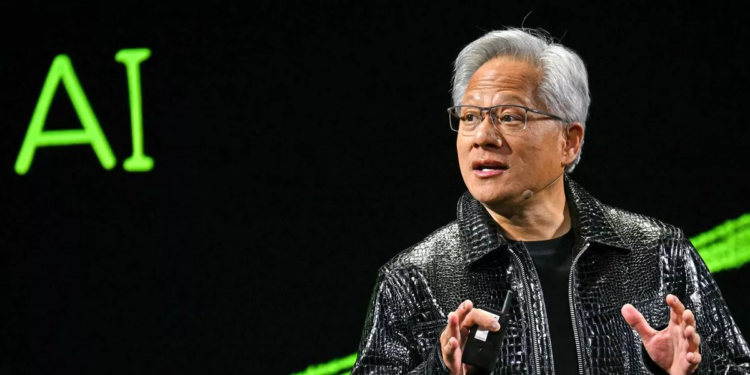Jensen Huang, the billionaire founder and CEO of chipmaker Nvidia, saw his net worth surge by $6.6 billion on Tuesday, bringing his total fortune to $92.3 billion.
The sudden rebound follows a steep market downturn triggered by the Trump administration’s new tariff policies that had shaken investor confidence across the tech sector just days earlier.
Huang’s windfall came as Nvidia (NVDA) stock jumped as much as 7% in early trading, leading a broad recovery among the “Magnificent Seven”, a group of the biggest U.S. tech companies.
Nvidia’s rise added to Monday’s 3.5% gain, capping off a volatile stretch that saw shares swing wildly in response to geopolitical uncertainty and tariff fallout.
The Trump administration’s two-step global tariff plan, announced on April 2, sent shockwaves through Wall Street. The policy includes a 10% baseline tariff on all global imports, which took effect over the weekend, and a forthcoming “reciprocal” tariff targeting countries that levy higher duties on U.S. products. The announcement triggered a staggering $1.8 trillion loss in market value across major tech stocks last week.
What this means for Nvidia
For Nvidia, the tariff threat hit close to home. The company relies heavily on manufacturing in Taiwan and China — regions now in the crosshairs of Trump’s new trade policies. China, in turn, has retaliated with its own set of tariffs on U.S. goods, leaving firms like Nvidia exposed on both ends of the supply chain.
- Despite the looming headwinds, investors appear to be reassessing the depth of the impact. Some analysts noted that Nvidia’s AI servers imported from Mexico remain exempt from the new tariffs under the United States-Mexico-Canada Agreement (USMCA), potentially softening the blow to its bottom line. Bernstein analyst Stacy Rasgon highlighted this exemption as a key factor behind the stock’s rebound.
- Nvidia wasn’t the only tech giant to bounce back. Meta shares surged nearly 6%, Tesla climbed just over 5%, and Amazon gained nearly 5%. Microsoft rose almost 4%, while Google (GOOG) and Apple advanced more than 2%.
- Still, the long-term outlook remains uncertain. Reports warn that tech firms’ global supply chains remain vulnerable, and the tariff dispute could widen. Apple, for instance, manufactures 90% of its iPhones in China. Tesla sources a significant portion of its parts from abroad, and Nvidia’s chips rely on complex international supply routes.
As trade tensions simmer, investors are bracing for more volatility. But for Jensen Huang, Tuesday was a rare moment of relief and a reminder that in the stormy world of tech and trade, fortunes can turn fast.
























